In a budget unveiled last month, Minnesota Gov. Mark Dayton proposed a .25 percent sales tax increase to fund an expansion of the Twin Cities metro area's public transit systems. The proposal has garnered enthusiastic support.
Marlys Harris reports on Gov. Dayton's proposal for a "0.25 percent tax on sales in the seven-county metropolitan area that would provide a permanent stream of money to expand LRT construction, add bus rapid transit lines and make up transit operating deficits." The plan has garnered support from legislators, and is viewed favorably by a majority of voters in the effected counties.
“To have the governor state that transit is part of his vision for the growth of the region in the 21st century and then to have him back that up with resources, well, it's a great way to start off a legislative session," says Peter McLaughlin, Hennepin County Commissioner and long-time public-transit advocate. "I'm incredibly appreciative of what the governor has done."
"Transportation chairs in both the state House and Senate -- Rep. Frank Hornstein (DFL-Minneapolis) and Scott Dibble (DFL-Minneapolis) -- endorsed the tax enthusiastically in a joint press release. 'It's highly unusual to have a significant tax increase proposed by a governor to benefit mass transit,' Hornstein later told me in a phone call."
Harris breaks down the litany of projects that the projected $250 million in tax revenues could fund: "That would be enough to provide an annual expansion of bus service (more routes, greater frequency and longer hours), fund the local portion of the cost of the Southwest LRT, add as many as 12 arterial bus rapid-transit or streetcar lines over the next 20 years, and eventually build the Bottineau LRT, which would stretch northwest of Minneapolis to Brooklyn Center, and the Gateway LRT, which would extend east of St. Paul into Washington County."
In a recent editorial, The Minneapolis Star Tribune expressed their enthusiastic support for Gov. Dayton's plan.
FULL STORY: Dayton offers game-changing transit plan

Maui's Vacation Rental Debate Turns Ugly
Verbal attacks, misinformation campaigns and fistfights plague a high-stakes debate to convert thousands of vacation rentals into long-term housing.

Planetizen Federal Action Tracker
A weekly monitor of how Trump’s orders and actions are impacting planners and planning in America.

In Urban Planning, AI Prompting Could be the New Design Thinking
Creativity has long been key to great urban design. What if we see AI as our new creative partner?

King County Supportive Housing Program Offers Hope for Unhoused Residents
The county is taking a ‘Housing First’ approach that prioritizes getting people into housing, then offering wraparound supportive services.

Researchers Use AI to Get Clearer Picture of US Housing
Analysts are using artificial intelligence to supercharge their research by allowing them to comb through data faster. Though these AI tools can be error prone, they save time and housing researchers are optimistic about the future.

Making Shared Micromobility More Inclusive
Cities and shared mobility system operators can do more to include people with disabilities in planning and operations, per a new report.
Urban Design for Planners 1: Software Tools
This six-course series explores essential urban design concepts using open source software and equips planners with the tools they need to participate fully in the urban design process.
Planning for Universal Design
Learn the tools for implementing Universal Design in planning regulations.
planning NEXT
Appalachian Highlands Housing Partners
Mpact (founded as Rail~Volution)
City of Camden Redevelopment Agency
City of Astoria
City of Portland
City of Laramie




























